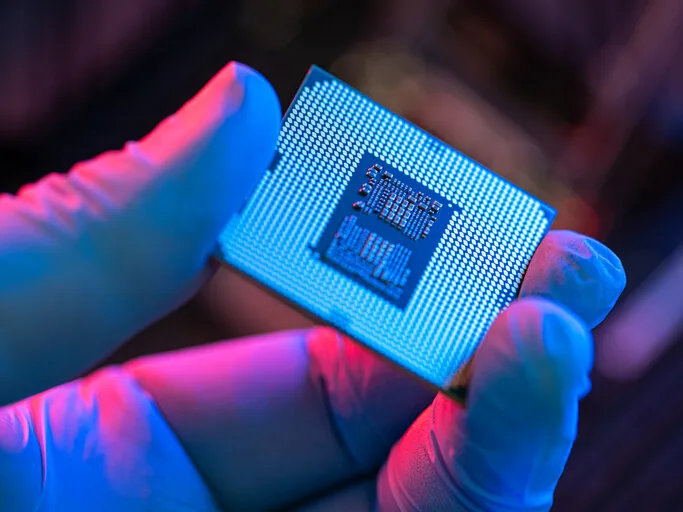
The CHIPS Act will give $52 billion in subsidies in hopes of incentivizing manufacturers to move or expand their production in the U.S. (Getty Images)
MICHIGAN—Michigan’s auto industry could get a big boost from the Chips Act. Here’s how.
The Chips and Science Act was passed by the US Senate last Wednesday, and the US House on Thursday. It’s a $280 billion bill that creates funding for domestic semiconductor production, and commercial product technology research. It’s now awaiting President Joe Biden’s signature to become law – which is expected to fall into place this week.
Officials in Michigan are praising the bill as a boon to the state’s auto manufacturing industry, which has dealt with a spate of production issues tied to a global shortage of computer chips used in the assembly of vehicles. One of the main goals of the bill is moving and expanding chip production into the US, which would likely translate to more cars built and sold in Michigan, and more jobs for Michiganders in the auto industry.
The Basics
Semiconductor chips help control the flow of electricity in electronics. They’re used in pretty much everything—cars, smartphones, refrigerators, and even air conditioners. A single new car can reportedly use more than 150 semiconductor chips. And for the last few years, those chips haven’t exactly been the easiest things for companies to find.
The pandemic took a toll on the economy. Even though society has generally moved on, a global semiconductor chip shortage has lingered—and it’s explained most simply by a strong demand and no supply. Amid the manufacturing struggle, consumer prices climbed.
Manufacturing plants in Michigan have also been forced to shut down due to the shortages. State officials said these chip shortages have impacted more than 575,000 auto-related jobs nationwide, and delayed the production of about 2.2 million vehicles.
The idea: Alleviate the supply chain woes and reduce costs for everyday consumers.
The Chips Act
The legislation—which has now passed through both the House and Senate—is expected to redirect a lot of federal funding to help alleviate the shortage. A preliminary analysis showed about $79 billion in new spending over the coming decade but a soon-to-be-released accounting is expected to put that figure closer to $280 billion.
That includes about $39 billion in direct subsidies for companies to construct and expand manufacturing facilities in the US, as well as about $11 billion for workforce training programs, and research and development efforts—including military uses.
An extensive tax credit wrapped into the bill could also be worth about $24 billion. About $2 billion will go to “legacy chips,” the chip technology that’s used to assemble vehicles.
Some key rules are also in play: Recipients of these funds cannot use them for stock buybacks, paying dividends, or any other bonus distributions. Companies that use these funds also can’t build or expand plants in China, or other potentially unfriendly countries.
The idea: Draw new manufacturing plants into the US, rather than places like China.
The Politics
The US Senate passed the Chips Act in a 64-33 vote, with support from both of Michigan’s Democratic state senators. And the US House passed it too, 243-187. All seven of Michigan’s Democratic representatives voted to support the measure—as did 24 Republicans who strayed away from the party line in order to vote yes on the bill.
Reps. Peter Meijer (R-Grand Rapids) and Fred Upton (R-St. Joseph) voted yes. Reps. Jack Bergman (R-Watersmeet), John Moolenaar (R-Midland), Bill Huizenga (R-Holland), Tim Walberg (R-Tipton), and Lisa McClain (MI-Bruce Township) voted no.
It still passed—even though Republican House leaders had urged their members to reject the Chips Act to retaliate against congressional Democrats, particularly after they were able to secure key votes to support an unrelated spending bill that puts more money toward climate change mitigation and helping lower prescription drug prices.
What are leaders in Michigan saying?
Gov. Gretchen Whitmer:
“I am so grateful to our congressional delegation for working across the aisle to get this done. [The Chips Act] will make once-in-a-generation investments to set Americans up for decades of growth by bringing vital supply chains home, creating and protecting tens of thousands of good-paying jobs, and lowering costs for families. I look forward to utilizing it to its fullest potential so we can build on Michigan’s economic momentum, support tens of thousands of jobs, and lower costs for Michiganders.”
Dan Kildee (D-Flint Township):
“America’s economy and Michigan workers should not have to rely on foreign made semiconductor chips. With this bipartisan bill, we can bring chip production back to Michigan and the United States, helping to lower costs for working families, boost our economy and create good-paying jobs.”
Elissa Slotkin (D-Lansing):
“By incentivizing companies to build new microchip plants here in the U.S., instead of places like China, this bill helps prevent future shortages like the ones that have shut down auto plants across the country, including GM’s Delta Township and Lansing Grand River plants.”
‘Gander Editor Kyle Kaminski contributed to this report.

VIDEO: Trump isn’t the only republican facing charges for alleged financial crimes
https://www.tiktok.com/@gandernewsroom/video/7361494909938978090 A whole lot of Michigan Republicans and lobbyists are facing criminal charges for...

VIDEO: It’s expensive to be poor in Michigan
https://www.tiktok.com/@gandernewsroom/video/7361154790300060974 Ever heard of predatory payday loans? Here’s how new laws could help protect...

Here’s everything you need to know about this month’s Mercury retrograde
Does everything in your life feel a little more chaotic than usual? Or do you feel like misunderstandings are cropping up more frequently than they...

The ’Gander wins multiple 2023 Michigan Press Association awards
MICHIGAN—The ’Gander Newsroom has earned multiple awards in the 2023 Michigan Press Association Better Newspaper Contest. The awards were announced...

Michigan Republicans ask Supreme Court to restrict medication abortion access
A lawsuit supported by Republicans could disrupt access to the most common form of abortion—even in Michigan, where reproductive rights are...






